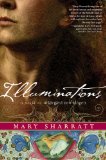Summary | Excerpt | Reading Guide | Reviews | Beyond the Book | Readalikes | Genres & Themes | Author Bio

A Novel of Hildegard von Bingen
by Mary SharrattShe is so bright and glorious that you cannot look at her face or her garments for the splendor with which she shines. For she is terrible with the terror of the avenging lightning, and gentle with the goodness of the bright sun; and both her terror and her gentleness are incomprehensible to humans. . . . But she is with everyone and in everyone, and so beautiful is her secret that no person can know the sweetness with which she sustains people, and spares them in inscrutable mercy.
—Hildegard von Bingen's vision of the Feminine Divine, from Scivias,
III, 4.15, translated by Mother Columba Hart, O.S.B., and Jane Bishop
Prologue: Apostate
Rupertsberg, 1177
THE MOST ANCIENT and enduring power of women is prophecy, my gift and my curse. Once, centuries before my existence, there lived in these Rhineland forests a woman named Weleda, she who sees. She took no husband but lived in a tower. In those heathen times, her people revered her as a goddess, for she foretold their victory against the Romans. But the seeress's might is not just a relic of pagan times. Female prophets crowd the books of the Old Testament—Deborah and Sarah, Miriam and Abigail, Hannah and Esther.
And so, in my own age, when learned men, quoting Saint Peter, call woman the weaker vessel, even they have to concede that a woman can be a font of truth, filled with vision, her voice moving like a feather on the breath of God. Mother, what is this vision you show me? With my waking eyes, I saw it coming. The storm approaching our abbey. Soon I would meet my nemesis face-to-face.
My blistered hands loosened their grip on the shovel, letting it fall into the churned up earth. At seventy-nine years of age, I am no longer strong enough for such labors, yet force of necessity had moved me to toil for half a day, my every muscle shrieking. Following my lead, my daughters set down their tools. With somber eyes, we Sisters of Rupertsberg surveyed our handiwork. We had tilled every inch of our churchyard. Though the tombstones still stood, jutting like teeth from the rent soil, we had chiseled off every last inscription. My daughters' faces were etched in both exhaustion and silent shock. Our graveyard was a sanctuary as holy as the high altar of our church. Now it resembled a wasteland.
Tears caught in my eyes as Sister Cordula passed me the crook that marked my office of abbess. Whispering pleas for forgiveness to the deceased, I picked my way over the bare soil until I came to the last resting place of Maximus, the runaway monk whose plight had driven our desperate act. The boy fled to us for asylum after his brothers committed unspeakable sins against him. Despite our every effort to heal his broken body and soul, the young man died in our hospice, and so we gave him a Christian burial.
But the prelates of the Archbishop of Mainz, the very men who had ignored the cruelty unfolding in the boy's monastery, had declared Maximus an apostate. Tomorrow or the following day, the prelates would come to wrest the dead boy from his grave and dump him in unhallowed ground as if he were a dead mongrel. So we razed our burial ground, making it impossible for any outsider to locate his grave. Had the prelates ever imagined that mere nuns would take such measures to foil them, the men we were bound to obey?
Raising my abbess's crook, I spoke the words of blessing. "In the name of the Living Light, may this holy resting place be protected. May it remain invisible to all who would desecrate it."
My heart throbbed like a wound when I remembered the boy who died in my arms, the one I had sworn before God to protect. He had committed no crime, had only been a handsome youth in a nest of vipers. Maximus had only an aged abbess and her nuns to stand between him and the full might of the Church fathers.
Excerpted from Illuminations by Mary Sharratt. Copyright © 2012 by Mary Sharratt. Excerpted by permission of Houghton Mifflin Harcourt. All rights reserved. No part of this excerpt may be reproduced or reprinted without permission in writing from the publisher.
Asking a working writer what he thinks about critics...
Click Here to find out who said this, as well as discovering other famous literary quotes!
Your guide toexceptional books
BookBrowse seeks out and recommends the best in contemporary fiction and nonfiction—books that not only engage and entertain but also deepen our understanding of ourselves and the world around us.